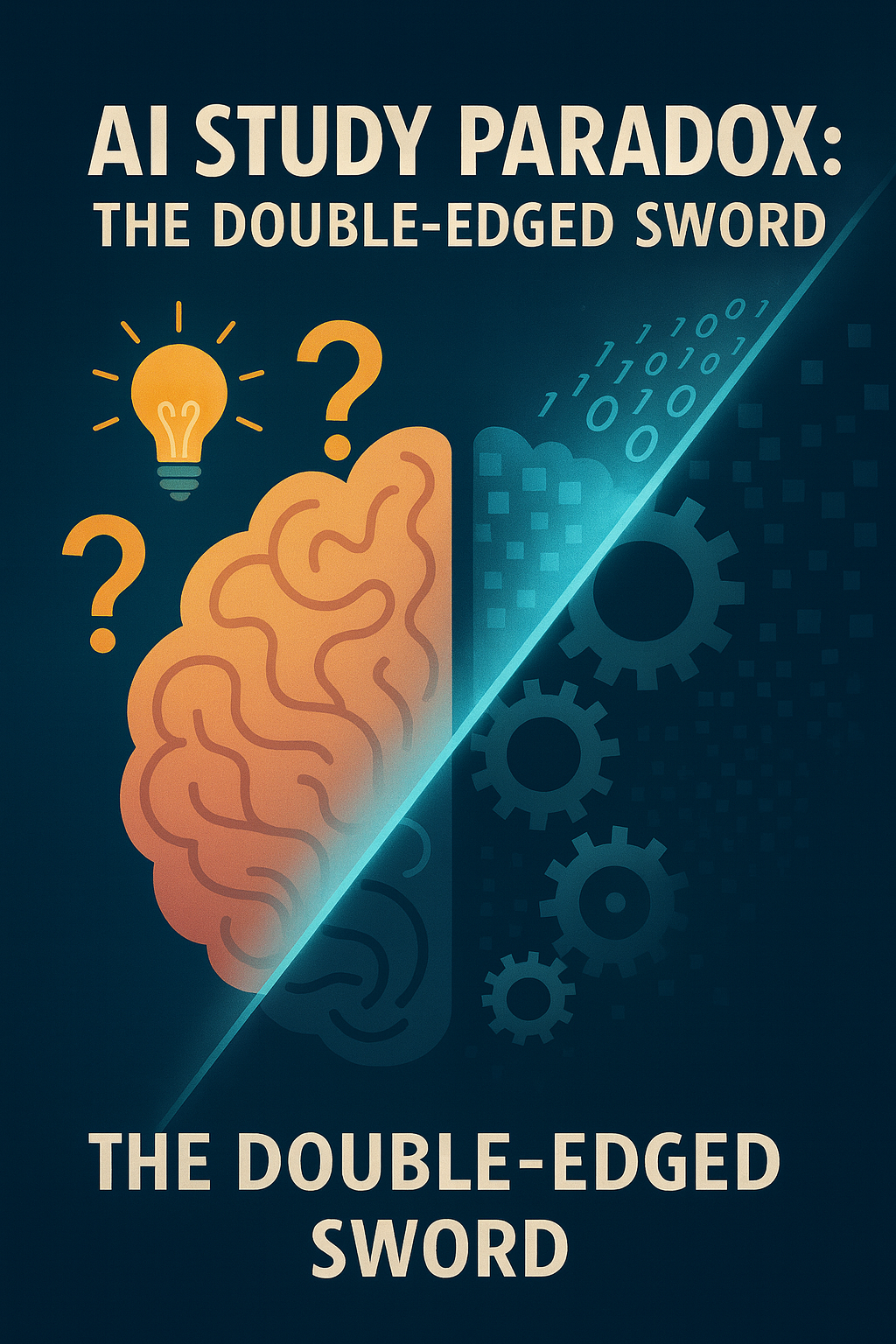The Homework Crisis: When AI Becomes a Cheat Code Instead of a Learning Tool
The Homework Crisis: When AI Becomes a Cheat Code Instead of a Learning Tool
We need to talk about what's really happening in students' bedrooms and study spaces across the world. Right now, millions of teenagers are doing something that should terrify every parent and educator: they're asking AI to do their homework. Not to help them understand. Not to guide them. Just to do it for them.
The Request That Says Everything
"Write my essay on Shakespeare." "Solve these math problems." "Answer these history questions."
These aren't learning queries. They're delegation requests. And AI, in its current mainstream form, obliges without hesitation. Perfect essays appear in seconds. Complex equations get solved instantly. History answers flow out complete with citations.
The student copies, pastes, submits. Mission accomplished. Learning achieved? Zero.
High School Students: The Primary Victims
While this phenomenon touches all age groups, high school students are bearing the brunt of this crisis. At an age where critical thinking skills should be developing rapidly, where analytical abilities should be sharpening, where intellectual independence should be emerging—they're instead becoming copy-paste machines.
The damage is profound:
- • Cognitive Atrophy: Skills that aren't used deteriorate. When AI does all the thinking, the brain's analytical muscles weaken.
- • Lost Preparation: High school is meant to prepare students for university and careers. What happens when they arrive at their first job interview or university exam without AI to lean on?
- • Dependency Formation: They're creating a crutch they may never learn to walk without.
Energy Wasted, Potential Destroyed
Think about the sheer computational power being consumed globally right now. Massive AI servers burning electricity to... write homework that teaches nothing. It's not just an educational tragedy; it's an environmental one. We're literally burning resources to help students avoid learning.
Every essay written by AI is a missed opportunity for a student to:
- • Develop their own voice
- • Learn to structure arguments
- • Practice critical analysis
- • Build writing stamina
- • Experience the satisfaction of creating something original
Yes, Cheating Has Always Existed, But This Is Different
"Students have always copied homework," some might say. "They've always found shortcuts."
True. But we've never seen anything like this.
Traditional cheating had natural limitations:
- • You needed to find someone who'd already done the work
- • Copied homework often looked suspiciously similar
- • There was effort involved even in cheating
- • The scale was limited
Where Are the Parents?
Here's an uncomfortable truth: most parents have no idea this is happening. They see their child "working" on the computer. They see completed homework. They might even see good grades. Everything looks fine on the surface.
But parents need to start asking different questions:
- • "Can you explain to me what you learned from this assignment?"
- • "Show me how you approached this problem."
- • "What was the hardest part about this homework?"
The Monitoring Paradox
Parents face a difficult balance. They need to monitor AI use without becoming surveillance states in their own homes. Some practical approaches:
- Open Conversations: Discuss AI use openly. Explain why doing your own work matters.
- Spot Checks: Randomly ask to see the process, not just the result.
- AI Literacy: Understand what AI can do so you can recognize AI-generated work.
- Clear Boundaries: Establish family rules about appropriate AI use for schoolwork.
Enter Didaxa: The AI That Refuses to Do Your Homework
This is where Didaxa is fundamentally different. We built an AI that will frustrate every student looking for a shortcut—and delight every student genuinely trying to learn.
The Didaxa Difference
Ask Didaxa to write your essay? It won't. Instead, it will:
- • Help you brainstorm ideas
- • Teach you essay structure
- • Guide you through creating an outline
- • Ask you questions that develop your thesis
- • Review your work and suggest improvements
Turning Temptation into Teaching
When a student approaches Didaxa with "just do my math homework," something beautiful happens. Didaxa responds with:
- • "Let's look at the first problem. What do you think the first step might be?"
- • "This looks like a quadratic equation. Do you remember what method we use for those?"
- • "You're on the right track! Now, what happens when we move this term to the other side?"
Built for Real Learning
Didaxa includes features specifically designed to prevent shortcut-seeking:
- • Process Tracking: Every interaction is logged, showing the learning journey, not just the outcome
- • Comprehension Checks: Regular prompts ensure understanding before moving forward
- • Parent Dashboard: Transparent reporting on how AI is being used
- • Effort Recognition: Celebrates the struggle and process, not just correct answers
The Choice We Face
We're at a crossroads. We can continue down a path where AI becomes the ultimate enabler of intellectual laziness, where a generation grows up having learned how to prompt but not how to think. Or we can choose tools that enhance rather than replace human cognition.
The homework crisis is real. Students are choosing the easy path in unprecedented numbers. But the solution isn't to ban AI or to surrender to its misuse. The solution is to deploy AI correctly—as a coach, not a substitute player.
A Call to Action
To Parents: Start the conversation today. Check how your children are using AI. Don't assume everything is fine because homework is getting done. To Educators: Update your understanding of AI capabilities. Design assignments that can't simply be delegated to AI. Value process over product. To Students: You're not cheating the system; you're cheating yourself. Every shortcut today is a skill you won't have tomorrow. To Everyone: Choose your AI tools wisely. Support platforms like Didaxa that prioritize genuine learning over quick answers.The future will belong to those who can think, not those who can prompt. Make sure you're preparing for the right future.
Because when the real tests come—in university, in careers, in life—AI won't be there to do them for you. But the skills you develop by doing your own work? Those will be with you forever.
This is the Didaxa difference. This is why we exist.
Written by
Didaxa Team
The Didaxa Team is dedicated to transforming education through AI-powered personalized learning experiences.
Related Articles
Continue your learning journey

The AI Study Paradox: Your Greatest Ally or Your Smartest Enemy?
AI can be a revolutionary study tool, but letting it do the thinking for you is a trap. Discover how to use AI to amplify your intellect, not replace it.

Behind the Curtain: How Multi-Agent AI Delivers Superior Learning Experiences
Discover how multiple AI agents work together behind the scenes, consulting databases and web sources to power truly adaptive, high-quality education.

How James's Father in London Saved £2,000 per Month on Private Tutoring with DIDAXA
From £50/hour for private tutoring to just £5 effective cost with DIDAXA: discover how a London parent revolutionized his son's A-level preparation while saving 80% on costs.
Experience the Future of Learning
Join thousands of students already learning smarter with Didaxa's AI-powered platform.